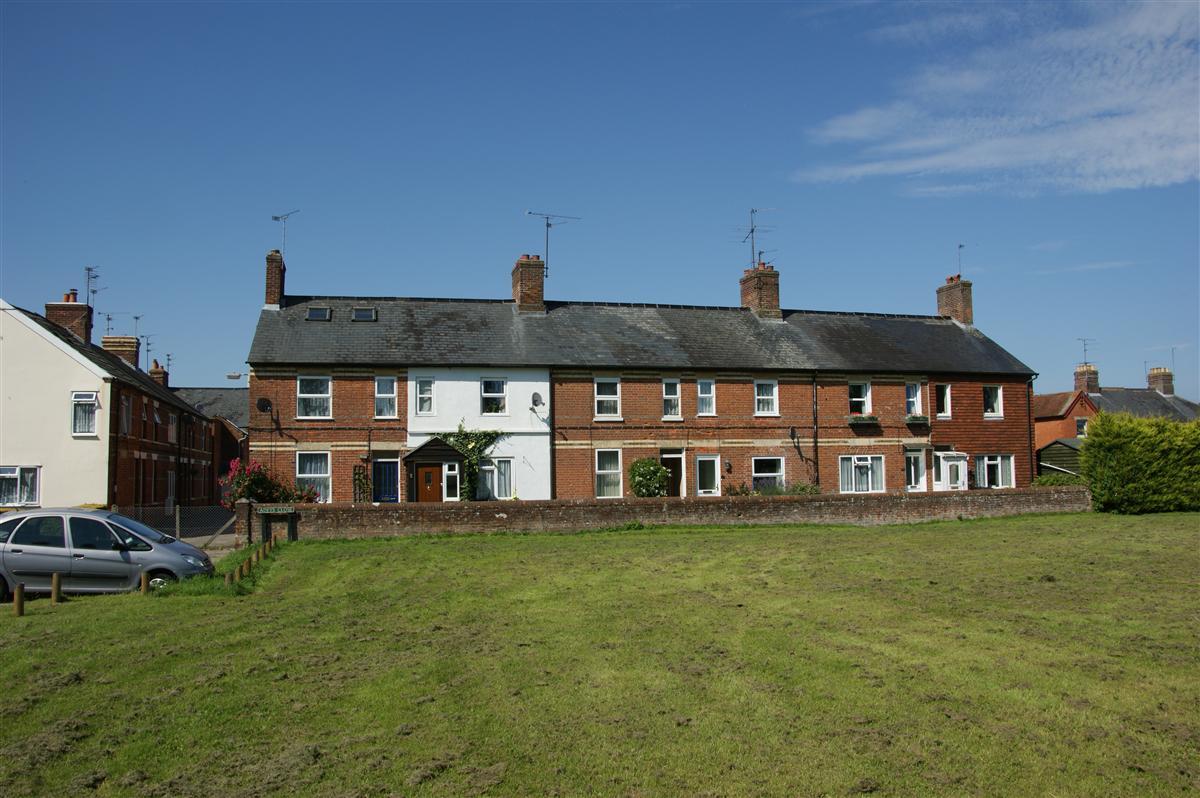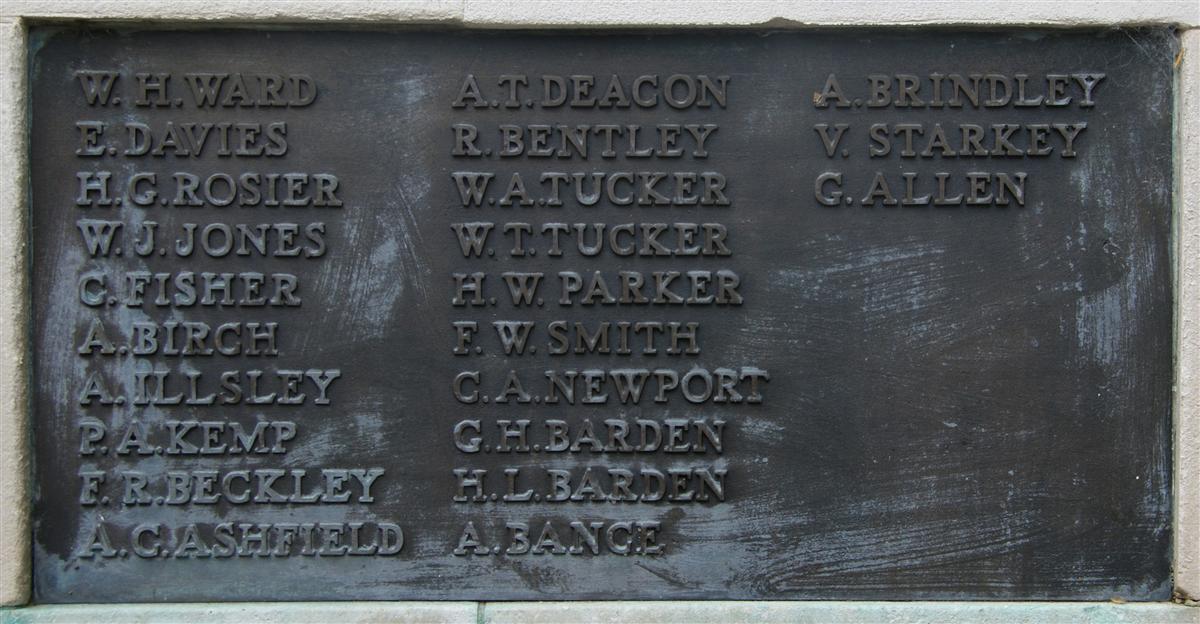Albert Walter Tucker
Private 23064 Albert Walter Tucker, 5th Battalion Worcestershire Regiment
Albert Walter was born on 11 September 1895 the son of Thomas Tucker and his wife Amelia née Fewtrell. Although his first name was Albert he was always known as Walter – even his service record has him as Walter and his name on Newbury’s war memorial is shown as W A Tucker. Thomas worked as a labourer for the Great Western Railway.
Thomas and Amelia had eight children in total; two died in infancy, and six survived to see the start of the Great War. It is a sobering reflection of the age to see that seven Tucker infants died in the Newbury district during the period of Thomas and Amelia’s marriage – with this infant mortality rate it is not practical to identify their two lost children. The survivors were William (born 1890), Edwin Maurice (1893), Albert Walter (1895), Bessie (1901), Charles Henry (1904) and Minnie Ann (1907).
Amelia died in 1909, leaving Thomas with six children to raise alone, though William and Edwin would have left school by that date and would have been contributing to the household income.

Adey's Buildings vewed from Stroud Green. No 12 is the second house in the terrace leading away on the left. |
In 1912 the family moved from Adey’s Buildings to 17 Railway Road, a similar terraced house alongside the railway; perhaps a little more convenient for Thomas’s work, but not a lot.
After school Walter started work as a grocer’s errand boy. By the time he enlisted at Reading on 13 November 1914 he was working as a porter. Initially he was appointed to the Oxfordshire and Buckinghamshire Light Infantry (the Ox & Bucks) – his regimental number was 16210.
Starting in the 8th Battalion for basic training, he transferred to the 3rd Battalion on 10 February 1915. His next move was to the Worcestershire Regiment (5th Battalion) on 23 June 1915. Days later he moved from the 5th (Reserve) Battalion to the 4th Battalion – a regular army unit that had been brought home from Burma following the outbreak of war. This appears to have been in order to bring the battalion up to strength prior to its embarkation on 3 July 1915 to join the Mediterranean Expeditionary Force – Walter was on his way to Gallipoli.
A month later (14 August) he was wounded with a GSW (gunshot wound) to the calf and penis, receiving treatment on the Hospital Ship Asturias . The wound meant his leaving the 4th Battalion and returning home to recuperate. Once fit again he was sent to the 6th (Reserve) Battalion pending a posting to an active unit, in his case on 30 November 1915 he went back to war with the 2nd Battalion, arriving in France on 3 December and with the battalion on 14 December.
 Walter's name on Newbury memorial, immediately below is his brother William. |
His luck did not improve; first an accident resulted in burns to his left leg and foot (2 February), then he was close enough to the explosion of a German mine to be diagnosed with ‘mine shock’ (27 June). Neither injury resulted in any time away from his frontline unit.
On 23 August 1916 Walter found himself in big trouble, under arrest, facing a Field General Court Martial, accused of ‘when on duty unnecessarily quitting the ranks’, conduct ‘to the prejudice of good order & military discipline’. Considering that it was not unknown for such conduct to result in the offender being shot at dawn, Walter must have been relieved when the court martial, having found him guilty, limited the punishment to a suspended sentence of 1 year’s hard labour. Not that suspension of the sentence did Walter many favours, life in the trenches was far more dangerous and probably no more confortable than life in a military prison.
Newbury Weekly News 5 Jul 1917 – Local War Notes
Six weeks ago Pte Walter Tucker of the 2nd Worcestershire Regiment, was officially reported missing on May 20th. A letter has just been received from his stating that he is a prisoner in Germany, that he is all right, hoping for a safe return some day. Pte Tucker is the son of Mr Tucker of 17 Railway Terrace, Newbury, and is one of the three sons who joined the army. William, of the Royal Berks, was killed in November, 1916, Walter, wounded in the Dardanelles, and returned to duty in France. Edwin is serving in the Oxford and Bucks Light Infantry.
On 20 May 1917 the 2nd Worcesters took part in an action at Croisilies (between Arras and Bapaume). It was an all too familiar story of brave men fighting there way forward against strong German positions in the Hindenberg Line. After taking the first line of German trenches with only light casualties but subsequent attacks on the German support trenches in thick fog saw the Worcesters suffering badly. The account on the regiment's website sums up the losses:
The casualties had been very heavy. Nearly half the fighting strength of the Battalion had fallen. The Battalion had gone into action with a "battle strength" of 530, and came out with but 280. Killed 2 officers (Capt. E. A. O. Durlacher, 2/Lt. P. W. Potter (died of wounds)) and 34 other ranks. Wounded 5 officers (Capt. H. C. Downes, 2/Lt. W. A. Cross, 2/Lt. G. Mason, 2/Lt. F. J. D. Gunston, 2/Lt. H. B. Ludlow Hewitt) and 134 other ranks. Missing 73.
For a more detailed account click.
Walter was held in the German POW camp at Merseburg – a town renowned at that time for the production of ammonia, a key ingredient for the production of explosives. No doubt the POWs would be found work supporting this industry.
Sadly his imprisonment turned out to be a sentence of death for Walter; while in the camp he contracted tuberculosis, reporting sick and being hospitalised on 15 December 1917. On 17 April 1918 he was repatriated as an invalid and was discharged from the army on 23 May, physically unfit (100%) for further service and given a disability pension. On 21 November 1918 he died at Abingdon Sanatorium and was buried locally. His passing was covered by the local paper:
Newbury Weekly News, 12 December 1918
Local War Notes
A few days since, Private Walter Tucker, 25th Worcesters, was buried at Abingdon, with military honours. Joining up early in the war, he was taken prisoner, but being invalided, he was returned to England, and after hospital treatment, was sent to Abingdon Sanatorium, but never regained his health, and died on the 20th November. A brother in the 5th Berks was killed in France, and another in the Oxon and Bucks is still on service.
His passing has gone unnoticed by the Commonwealth War Grave Commission so his grave, in Abingdon Cemetery, will not have one of the familiar CWGC markers. Representations will be made in order to rectify this situation and, at the least, get his name recorded on their Roll of Honour. Watch this space...
However, he is remembered on the Newbury town war memorial along with his brother William. Their brother Edwin also saw service, with the Oxfordshire and Buckinghamshire Light Infantry; thankfully he survived the experience. The fourth brother, Charlie, was too young to serve.

Find a memorial :
| Died this day: | |
| 02 March 1918 | |
| N G Burgess | |
| Newbury |

Like this site? Show your appreciation through a donation to a great charity.